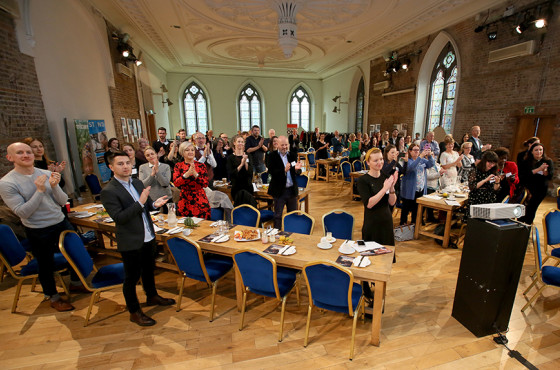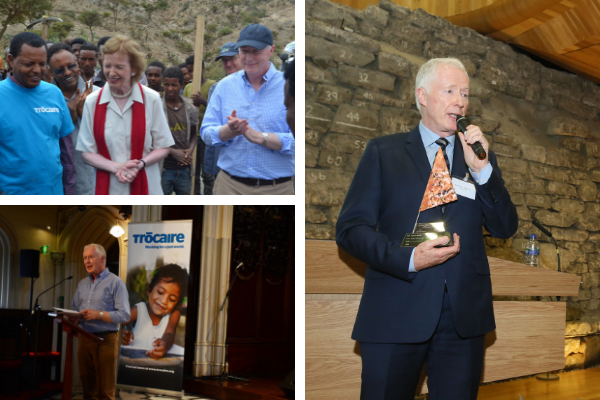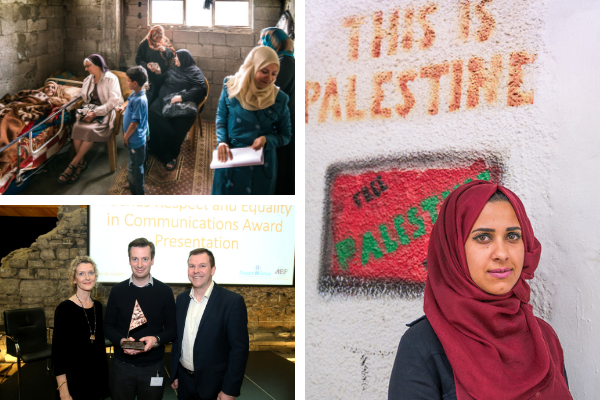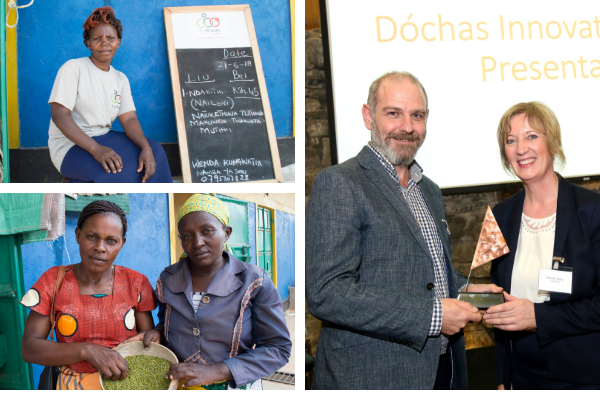Reflections from Dóchas Awards 2018 Winners

07 Feb 2019
As we get stuck into priorities for 2019, we took some time to catch up with the winners of the Dóchas Awards 2018 to provide some inspiration for the year ahead!
The Dóchas Awards celebrate the extraordinary efforts of our member organisations and individuals who work tirelessly to eradicate global poverty and inequality. The Dóchas Awards took place on 5 December in Wood Quay Venue, Dublin.
- Lifetime Achievement Award - Mary Robinson: Watch the full on-stage interview at the Dóchas Awards ceremony
- Global Citizen Award - Éamonn Meehan: Read the interview
- Respect and Equality in Communications Award - This is Palestine, Trócaire: Read the interview
- Innovation Award - TruTrade Africa, Self Help Africa: Read the interview
- Read the Dóchas Awards 2018 event summary
Global Citizen Award - Éamonn Meehan

The Global Citizen Award celebrates an outstanding individual who shows determination, leadership and inspires and empowers others to work towards ending global poverty and injustice.
The Global Citizen Award 2018 was presented to Éamonn Meehan, former executive director of Trócaire with over 27 years’ experience with the organisation, first as Programme Manager for the Southern Africa region, then as Head of International Programmes, Deputy Director and Executive Director.
How did you feel when you found out that you were nominated for a Dóchas Award? And how did it feel when you won?
When I heard that I’d been nominated my immediate reaction was a sense of gratitude to those who had nominated me and who thought me worthy of the award. When I saw the other nominees I felt that their personal achievements were extraordinary and required huge personal energy and dedication to achieve what they had done. I felt that I always had a well-established organisation supporting me and that was a huge advantage for me. You know that phrase about “the shoulders of giants”!
On the awards evening I was actually quite shocked when the announcement was made that I had won the Global Citizen award as I honestly expected it to go to someone else. My more thoughtful response was what I actually said when presented with the award: it was a recognition of the great work done over many years by my brilliant colleagues in Trócaire who support civil society in many parts of the world with passion and commitment and who campaign and advocate for and with people living in poverty and in vulnerable situations in over twenty countries. They supported me and encouraged me over the years and their example was an inspiration to me.
You won the Global Citizen Award – what has been the most challenging part of your work, and what has been the most rewarding?
Over the years I found one of the most challenging aspects of the work was having to make decisions about which issues to focus on, which countries to work in, and therefore having to make difficult choices when there are so many injustices needing a response. I often found leaving people, places and organizations to return home a difficult thing to do. One example of this was Gaza in April 2018. I led a CIDSE delegation which spent time visiting local organizations involved in human rights, UNWRA, as well as the very small Christian community there. People are quite literally imprisoned in Gaza with no opportunity to leave for any reason whether for work, education, health care or even to visit relatives in Israel or the West Bank. Leaving all those people behind, who gave us so much of their time and hospitality, was difficult.
Fundraising is also always challenging for NGOs. Even though Trócaire has a strong support base and a high profile it’s always a worry as any drop-off in donations can have an immediate impact in terms of programmes and also the security of jobs of staff.
The rewards are many in our work, not least having the opportunity to meet and work with many incredible people and organisations. This was enabled by Trócaire’s development model which is a partnership approach. In my career, my early work in Trócaire in the 1990s was on the South Africa programme where I had the opportunity to work with many anti-apartheid activists and organisations in South Africa and in Ireland. I was in Harare the day Nelson Mandela was released from prison and I will never forget the jubilation throughout the city as the news broke and television images came through from Cape Town. I learned a lot from this experience and also understood that situations such as apartheid, which seem entrenched and invulnerable, can be overcome and transformed. I have brought that lesson to many situations over the years. Change is not only possible, it is inevitable. Civil society can have a huge influence in bringing about change and indeed in South Africa it was central to that change while building an international coalition was also a key component in the transformation. This is also true today of other situations.
Seeing my colleagues achieve their potential was always a hugely rewarding experience for me as well.
Who do you admire in the field? Name a few organisations or individuals who do similar work that you find inspiring, and tell us why.
Who do I admire in our sector? Who inspires me? Well, that would be the individuals whom I’ve met in hundreds of local NGOs and civil society organisations across the world, whether large or small, who struggle against powerful forces, usually with limited resources, and who do so with a commitment and courage which inspires us all.
Indeed, civil society has a vital role to play in building a world based on justice and peace, equality and the rule of law, and free from poverty. Yet, now, in many countries civil society space is under attack while our colleagues often suffer prejudice, stigma, physical attacks, and closing legal and constitutional space. This is now also happening in parts of Europe. If you are struggling for environmental rights in Honduras or Brazil, for LGBT rights in Uganda or Russia, for human rights in Israel and Palestine or for migrant rights in Hungary or the USA you are now under suspicion and often in physical danger.
Last year more than 70 environmental defenders were murdered around the world. This is unacceptable and must be challenged. As Irish civil society we need to be strong and determined in our support for global civil society, now more than ever. Part of that support will be financial, technical and through effective partnerships and coalitions. But a key part of it will also be through our advocacy and campaigning efforts here at home towards our own Government and the wider public to inform, educate and influence. That is probably our primary responsibility.
Respect and Equality in Communications Award - This is Palestine, Trócaire

The Respect and Equality in Communications Award celebrates inspiring communications. It recognises an organisation that consistently uses empowering images and messages in their communications that challenge stereotypes and are based on the values of respect, equality, solidarity and justice, in line with the Dóchas Code of Conduct on Images and Messages.
The Respect and Equality in Communications Award 2018 was presented to Trócaire for ‘This is Palestine,’ a documentary following John McColgan through Gaza and the West Bank, meeting Israeli and Palestinian activists working together for a just peace. Eoghan Rice, Head of Communications at Trócaire, spoke to us about Trócaire's win.
How did you feel when you found out you were nominated for a Dóchas Award? And how did it feel when you won?
We were delighted to be nominated for the award. NGOs in Ireland are producing excellent and very innovative communications so it is very pleasing for Trócaire to be selected for the award. The other two shortlisted nominees were really interesting projects so we felt that any of them would have been worthy winners. Naturally we were delighted when Trócaire was announced as the winner.
You won the Respect and Equality in Communications Award for your documentary This Is Palestine – what was the most challenging part of creating this documentary, and what was the most rewarding?
The idea behind the documentary was to tell the story of what is happening in Palestine through the voices of people affected. We met some incredible people, who all told their stories with such dignity. Some of their stories were very difficult to hear, particularly in Gaza where people we interviewed had lost family members including very young children.
It was extremely rewarding to see the documentary finding such a large audience. Over 600,000 people have watched it online and it also got a great reaction when TG4 screened it. A lot of people who watched it told me how moved they were by what they had seen, so it is rewarding to know that we have given a platform for people in Palestine to tell their stories.
Who do you admire in the field? Name a few organisations or individuals who do similar work that you find inspiring, and tell us why.
I’m constantly inspired by the people who work for Trócaire ‘on the ground’. Our staff overseas are the most dedicated and passionate people I have ever worked with. It is genuinely an honour to work with them and to help highlight the issues they work with day-in, day-out.
Innovation Award - TruTrade Africa, Self Help Africa
The Dóchas Innovation Award celebrates organisations that are taking new, creative and forward-thinking approaches in their work to address the increasingly complex and challenging environment in which we work.
The Innovation Award 2018 was presented to TruTrade Africa, a subsidiary of Self Help Africa. TruTrade is a social enterprise that provides smallholder farmers in Kenya and Uganda with a reliable route to market, and fair prices for their product, opening up access to finance in a way that was not possible under a cash-based system, particularly for women. George Jacob, Head of Communications at Self Help Africa, spoke to us about Self Help Africa's win.
How did you feel when you found out you were nominated for a Dóchas Award? And how did it feel when you won?
Self Help Africa was grateful and honoured to have been nominated for, and even more so to have won, the Dóchas Innovation Award. The challenges of ending hunger and poverty in sub-Saharan Africa, which is our mission, are multi-faceted, and the solutions can require creativity and imagination. With TruTrade, we set out to harness technology in a way that would make it easier for rural poor farming families to earn more from the crops that they grow. It did.
The trading platform has allowed thousands of farmers in Uganda and Kenya to source new markets for their crops, and has also meant that they are paid a fair price – and on time - for their produce. A really positive spin-off has been the way in which this technology has been embraced by women farmers. TruTrade has made trading safer for women, with the mobile phone payment system removing the risk associated with cash. As an organisation that is working with some of the most remote and least-connected communities on the African continent, it has been heartening to find ways - such as TruTrade - where we can harness readily available mobile technologies, and use them for the good of the people that we work with.
Being recognised by Dóchas for this work is indeed satisfying, and this award will encourage and inspire us to continue to seek out more innovative answers to the challenges facing people in sub-Saharan Africa in the years to come.
You won the Innovation Award for TruTrade - what was the most challenging part of this work, and what was the most rewarding?
A considerable amount of awareness raising was undertaken before TruTrade was rolled out, and developed to where it is today. As we were establishing the TruTrade platform, there was some trial and error before we got it right, and were delivering a service that was of practical benefit to the farmers for whom it was intended. This learning is always challenging, trying both to manage expectations whilst also striving to secure the buy-in of farmers. For TruTrade to work, it was essential that farmers were prepared to supplant the traditional ways of conducting business - in cash - in favour of a completely new way of doing business, using a technology that dealt in virtual money to a phone account.
TruTrade was also successful because it was more than just a trading platform – its success is also down to the fact that the service was active in sourcing new potential markets, negotiating good prices for farmers’ crops, even before harvest. Once TruTrade demonstrated that it was prepared to pay its farmer suppliers promptly, any initial scepticism fell away.
What’s next? What are you working on at the moment that you’re excited about?
There is a huge amount of scope for new technology to be used to improve both agriculture and trading systems across Africa. Digital imaging that can analyse soil types, that can identify pests and diseases in crops, and a host of other tools that can monitor, measure and evaluate the actual impact that projects are having, offers a great deal of potential for future innovation within Self Help Africa.
The potential of this technology is really exciting, and the more that we bring it into everyday use, the more that we are discovering how we can improve the work that we are doing, and the impact that we can have in improving agriculture - and thus eradicating extreme poverty - for millions of people in Africa.
Who do you admire in the field? Name a few organisations or individuals who do similar work that you find inspiring, and tell us why.
Root Capital are an interesting organisation with whom we see great synergies. Like Self Help Africa they see the business potential of agriculture, and invest in the growth of agricultural enterprises so they can transform rural communities. These businesses purchase crops such as coffee, cocoa, or grains from thousands of smallholder farmers, and like Self Help Africa they then seek to connect members to markets and help improve their farming practices.
Also on the business side of agri-enterprise are TechnoServe, who work with enterprising people in the developing world to build competitive farms, businesses, and industries. TechnoServe tries to harness the power of the private sector to help people lift themselves out of poverty. By linking people to information, capital and markets, they are attempting to create lasting prosperity for families and communities.
There is much to admire too about One Acre Fund, an organisation that supplies smallholder farmers in East Africa with asset-based financing and agriculture training services to reduce hunger and poverty.
Using a market-based approach, One Acre Fund facilitates activities and transactions at various levels of the farming value chain, including seed sourcing and market support. One Acre Fund works hard to gather and collate evidence of impact across every single activity that it undertakes, and carries out a detailed analysis of its work to guide its activities in the future. All organisations that work in international development now appreciate the huge importance of being able to measure impact, but One Acre Fund are particularly strong in this area.
The opinions expressed in this blog are the authors’ own and do not necessarily reflect the views of Dóchas.
